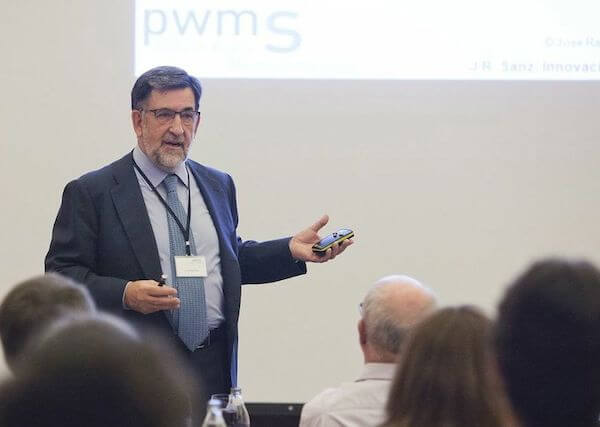Interview with Jose Ramon Sanz, Founder of the Fundacion NUMA
José Ramón Sanz belongs to the third generation of a business family responsible for automotive giant Dalphimetal, now in its fourth generation. With an abundance of support from each generation, the business has grown to generate wealth for both the family and their social environs. Before merging with TRW Automotive Holdings Corp. (NYSE: TRW) Dalphimetal was a world leader in the manufacture of steering wheels and the third-largest European supplier of airbags. One of the family’s proudest accomplishments is the firm’s commitment to society. Their continued pledge to civic duty led the family to sign various partnership agreements with the ONCE Foundation and as a result employ 400 persons with disabilities. In 2005, the family Sanz Gras sold the 68.4% of their shares in Dalphimetal to TRW, the global leader in active and passive safety systems, embarking on the next stage of its journey. José Ramón Sanz, fourth generation family business member and founder of the Fundación NUMA for innovation in the field of Family Business, spoke to Tharawat magazine about what family businesses mean to him and the journey he has taken to write his own chapter.
How would you describe your family business experience?
Although it was always a huge challenge, I feel lucky that our business activity was centred on vehicle components. It was already a global market when I first joined, with the competitive, dynamic and demanding nature it imposes on all its professionals. I was able to get involved in the international expansion of the business (Europe, Asia, North Africa, etc.) and was fortunate to find exceptional partners in Germany and Japan, among other places. I also learned the Continuous Improvement and Total Quality Management philosophy, which has since formed part of my own principles and values, and to a certain extent, those of my entire family.
My wife and I feel very fortunate because over the course of our lives we have been able to develop our own professional and personal potential. We are proud to see that our children have a deep-rooted business spirit, are well-prepared for the modern world and enjoy significant prestige in the industries where they’ve developed. They also contribute their talent to the common family business.
What makes you passionate about family firms?
Business families have a huge capacity to generate wealth for the family itself and society at large through their business and investment operations, as demonstrated by a number of studies. Their cross-generational commitment brings enormous consistency, effectiveness and efficiency to whatever they do. Family businesses successfully combine business spirit with cautious wisdom to protect the business for generations to come. They always strive to achieve excellence.
One particularly revealing fact is that ever since records have been kept the contribution of family businesses to global GDP has remained particularly constant. Business families have successfully led and managed the changes arising from economic crises and socio-political upheaval to ensure the survival of their projects.
Which values make Dalphimetal special and how have they translated into accomplishments?
In our family business, we have been lucky enough to successfully maintain a series of common values over the course of four generations: hard work, humility and caution, commitment to our main stakeholders (specifically partners, employees and their families and main suppliers), and a commitment to society. We also attribute great importance to the strategic vision of the business and we avoid placing limits on the challenges we set for ourselves. We have maintained an innovative spirit and a customer satisfaction-based approach.

Moreover, we have always been firmly committed to efficiency and results. As I said before, the Total Quality Management philosophy has ruled our lives. All these values have enabled us to grow and create new sources of wealth, and they represent the driving force behind our continued existence.
Nonetheless, I believe that many of these values are shared by the majority of family businesses. Business families know how to pass on their commitment and their creative leadership enables them to generate a strong commitment from all other non-family members of the business. And that is highly beneficial.
Which three components are necessary for family businesses to become and remain successful?
We believe that the key to success lies in managing the family business from a global perspective, creating synergies between the different core areas (the family, shared and individual business activities and financial investments, and their interrelations). It’s tough to sum up in only three issues, but it could be said that:
1. They should ask themselves and identify what unites them. Principles, values and a vision for the future are what immediately come to mind for our business. The family business spirit can live on in many ways. The children can set up their own businesses and contribute to the common family business however they see fit. In times during which what unites them isn’t strong enough and it becomes impossible to find common ground for family cooperation, forcing the issue is not a good idea. In such situations, I always say there’s no need for melodrama; “Don’t worry, be happy.”
2. In order to develop an integrated and effective business strategy which encompasses the family’s common and individual business activities as well as the investments of all members of the family, a family wealth strategy that suits the interests and needs of the whole family must be drawn up first.
3. Strategy should be established as a framework for cooperation that includes both the family’s governing bodies and a management and decision-making system, which considers the family a correlating factor between all its assets.
What inspired you to found the Fundación NUMA?
My main motivation was born of a personal need and also a need for my family to better understand our new business. After the divestment of Dalphimetal, which went on to form part of TRW Automotive, my family embarked upon a new personal and professional journey for which we thought it was essential to provide ourselves with specific training. As we searched for the knowledge and tools necessary for this new era, we discovered a number of excellent academic contributions to wealth management, family businesses and business families separately. However, they were too specific and more importantly we could not find an all-round family business knowledge. We needed a global response to our new requirements. Consequently, the entire family studied the first Private Wealth Management (PWM ) course at The University of Chicago Booth School of Business in 2007.
Whilst undertaking the Chicago programme, we discovered that we shared similar challenges, opportunities and needs with many other business families, and that the other family business experiences and best practices could offer many of the answers we were seeking. The programme was so useful to us that with the help of Stuart Lucas (founder of the Chicago PWM Programme and current co-director of the PWMS Programme in Spain) and The University of Chicago Booth School of Business, we decided to set up a Spanish version of the course that was more suited to address the specific features of the more family-orientated Latin culture.
This situation, and the chance given to our family to have a forum that would serve us as a meeting-place to foster inter-generational cooperation and exchange ideas and experiences, led us to create the Fundación NUMA . The results have been excellent.
The Foundation seeks to help other family business leaders tackle their challenges from the same globally innovative family business standpoint. We believe that joint management of the main cornerstones of a family business (the family, shared and individual business activities and financial investments, and their interrelations) and of the shared family risks offers an opportunity to generate value within the family and society at large.

Which areas of the family business model do you think require the most attention?
There are several areas where improvements can still be made. For example, the development of family capital (understood as the total sum of the family legacy plus the relational, human and emotional capital of the family), the management of innovation and internationalisation, the improvement of effectiveness (especially financial resource effectiveness) and the application of that global vision of shared family risks (such as reputational risk) arising from the interrelations between their investments, and family capital.
We also believe that special focus should be placed on developing multi-generational cooperation to ensure that the eventual hand-over process is not viewed as a traumatic event for the family. We prefer to approach these transitions as succession rather than a hand-over because it does not have to be perceived as the replacement of one person by another.
Is the family business a model for the future? Can corporate families increase their influence on economic policies?
Yes, of course it’s a model for the future. Unlike what many people think, family businesses survive just as long if not longer than non-family businesses. New analyses on the longevity of family businesses (which have been carried out from an entrepreneurial perspective embodied with the family business spirit) have revealed that family businesses are successful in dynamically adapting their business portfolio over time. They also offer revealing figures, such as the fact that business families create an average of 5.4 companies.
Family businesses account for 85% of all Spanish companies and constitute the basis for the creation of wealth in Spain, representing 70% of GDP and 70% of private employment in the country. Similar figures are mirrored practically everywhere else in the world. Family businesses are also imperative because of their commitment to society, which is backed by a long-term vision, helping generate sustainable wealth for their respective localities. It is essential for public institutions to support dialogue with business leaders and create the right mechanisms to allow us to work together on implementing successful measures and building a better future.
Tharawat Magazine, Issue 22, 2014
Original interview posted on Tharawat Magazine
Featured Picture Courtesy of Fundacion NUMA
